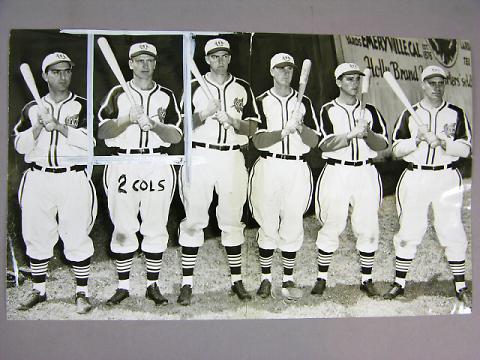2007.1.289
(21.27 cm HIGH x 34.92 cm WIDE)
Oakland Oaks (PCL)From Wikipedia, the free encyclopedia http://en.wikipedia.org/wiki/Oakland_Oaks_%28PCL%29 (7/13/2007)The Oakland Oaks were a minor league baseball team which played in the Pacific Coast League from 1903 until 1955. Along with the Los Angeles Angels, Portland Beavers, Sacramento Solons, San Francisco Seals, and Seattle Indians, the Oaks were charter members of the Pacific Coast League which was founded in 1903. The team finished last that year, and finished either last or next to last place four more times before winning its first PCL pennant in 1912. The Oaks (or �Acorns� as they were also called) played their home games at Freeman�s Park at 59th Street and San Pablo Avenue and at Recreation Park in San Francisco.After the 1912 season, the Oaks opened their new stadium, named Oakland Ball Park (or simply Oaks Park) though it was located in the neighboring city of Emeryville at San Pablo and Park Avenues. In their first season at Oaks Park the Acorns finished last, and were mired in the second division for more than a decade. In 1916, a struggling Oaks team made history by breaking the professional baseball color line, as Jimmy Claxton pitched in both ends of a double-header on May 28th, 1916. He was introduced to the team as an American Indian, but once the team discovered that his ancestry was both Native American and African, he was fired.In 1927, the Oaks won their first pennant at Oaks Park, finishing 120-75 (.615), 14_ games over the runner-up Seals.In 1943, a controlling interest in the Oaks was purchased by C. L. �Brick� Laws, who operated the team for its remaining seasons. In 1946, Laws hired Charles �Casey� Stengel, the former manager of the Brooklyn Dodgers and Boston Braves of the National League to manage the Oaks. He responded with second and fourth place finishes, before the club won its most celebrated pennant in 1948. It was in Oakland that Stengel developed his talent for �platooning,� i.e., juggling his lineup to maximize each player�s potential in given situations, that served him so famously as manager of the New York Yankees.On October 18, 1967, twelve years after the Oaks played their last game in Emeryville, the American League owners gave Kansas City Athletics president Charles O. Finley permission to move the Athletics to Oakland for the 1968 season.
Used: Oakland Tribune


